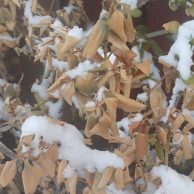 We’ve just endured one of the coldest and snowiest winters in the last 16 years.
We’ve just endured one of the coldest and snowiest winters in the last 16 years.
On December 22nd Boulder saw low temperatures of minus 24 degrees Fahrenheit, followed by minus 10 on January 30th , and again in late February the temperature fell to minus 11. These cold temperatures seem to be the explanation for damage to plants that we are seeing.
The foliage of broad-leafed evergreens are showing the most visible damage. Mahonia aquifolium (Oregon Grape Holly), and evergreen Euonymus shrubs (photo above) have turned tan or brown. This is not so unusual in a cold winter, and both of these species are tough and will most likely drop the old leaves and put out new healthy leaves. More troubling is the damage to the native evergreen Mountain Mahoganies, like Cercocarpus ledifolius; we have never seen their leaves turn brown in previous winters. Hopefully, not all their leaves are dead and they will be able to re-leaf. We are also seeing damaged foliage on Arizona Cypress trees, where a third of the foliage is now brown. And even some other coniferous trees have a lot of brown needle tips.
It is surprising that the hardy Manzanitas (Arctostaphylos varieties) and Dwarf Mt. Lover (Paxistima), both broadleafed evergreens, have come through the winter looking beautiful.
We can’t tell at this time what will grow back and what will not. We will need to cut back any branches that are really dead and do not grow new leaves or needles, but Now is Not the time to do this pruning. Sometime later in the spring, when plants have fully leafed out, you’ll be able to tell if a branch is really dead. One trick is to use your fingernail to scratch the bark in a small area: if the wood underneath is green, it is alive; if it is brown, it is dead. Also look to see if the thin bark on younger branches is wrinkled, which is another sign that the wood may be dead.
Deciduous shrubs and trees may have sustained winter damage as well. Wait until other woody plants are fully leafed out before pruning. Woody perennials like Rosemary and Lavender may have dead, crispy foliage, but wait to see if they will sprout from the ground or the lower portion of the stems as Spring progresses. When you see new growth coming, cut back the dead stems.
It takes energy for plants to regrow leaves and branches and to recover from winter injury and stress. You can support their recovery with light applications of organic fertilizers, kelp and compost tea. Strong fertilizers may promote too much growth. It is best to gently support root growth and general vitality and to support the microorganisms.
